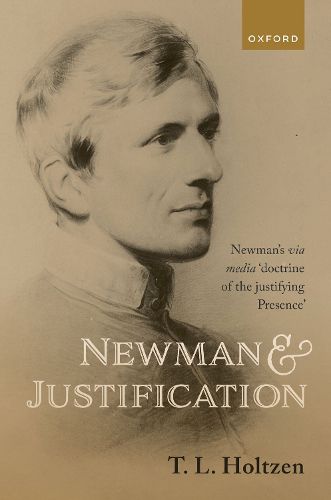Readings Newsletter
Become a Readings Member to make your shopping experience even easier.
Sign in or sign up for free!
You’re not far away from qualifying for FREE standard shipping within Australia
You’ve qualified for FREE standard shipping within Australia
The cart is loading…






Newman and Justification examines John Henry Newman's via media 'doctrine of the justifying presence' in his Lectures on Justification. T. L. Holtzen contends that Newman put forth his via media doctrine of the justifying presence by employing a trinitarian grammar of divine inhabitation in which the Holy Spirit is the formal cause of justification as a solution to the Reformation debate over justification. Newman sets his via media of justification between the extremes of justification by 'mere imputation' in 'popular Protestantism' and that of justification by works-righteousness in 'English Arminianism' and 'Romanism'. The word 'justification' means both being declared and being made righteous because the eternal Word is spoken into the soul by the Holy Spirit in justification. Newman identifies this with 'the gift of righteousness' (Romans 5:17) and calls it the 'doctrine of the justifying presence'. The justifying presence is an imparted righteousness, in distinction from both the Protestant notion of imputed and Roman Catholic idea of inherent righteousness. The justifying presence comes through the sacraments, creates faith in the human soul, and begins a renewal in good works, all of which in different ways justify. The divine inhabitation of the Holy Spirit in the soul is the formal cause of justification by causing a duplex iustitia of both Christ's imputed righteousness and by beginning an actual righteousness in renewal. Newman's via media 'doctrine of the justifying presence' has great ecumenical promise because it shows how the trinitarian grammar of justification necessarily causes renewal through divine inhabitation.
$9.00 standard shipping within Australia
FREE standard shipping within Australia for orders over $100.00
Express & International shipping calculated at checkout
Newman and Justification examines John Henry Newman's via media 'doctrine of the justifying presence' in his Lectures on Justification. T. L. Holtzen contends that Newman put forth his via media doctrine of the justifying presence by employing a trinitarian grammar of divine inhabitation in which the Holy Spirit is the formal cause of justification as a solution to the Reformation debate over justification. Newman sets his via media of justification between the extremes of justification by 'mere imputation' in 'popular Protestantism' and that of justification by works-righteousness in 'English Arminianism' and 'Romanism'. The word 'justification' means both being declared and being made righteous because the eternal Word is spoken into the soul by the Holy Spirit in justification. Newman identifies this with 'the gift of righteousness' (Romans 5:17) and calls it the 'doctrine of the justifying presence'. The justifying presence is an imparted righteousness, in distinction from both the Protestant notion of imputed and Roman Catholic idea of inherent righteousness. The justifying presence comes through the sacraments, creates faith in the human soul, and begins a renewal in good works, all of which in different ways justify. The divine inhabitation of the Holy Spirit in the soul is the formal cause of justification by causing a duplex iustitia of both Christ's imputed righteousness and by beginning an actual righteousness in renewal. Newman's via media 'doctrine of the justifying presence' has great ecumenical promise because it shows how the trinitarian grammar of justification necessarily causes renewal through divine inhabitation.